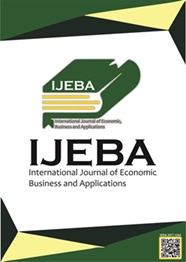Scientific Management Theory: a Critical Review from Islamic Theories of Administration
Abstract
Keywords
Full Text:
PDFReferences
A. Yusuf Ali, “The Meanings of the Holy Qur ’ an,” pp. 1–209, 1992.
S. P. Waring, “Peter Drucker, MBO, and the corporatist critique of scientific management,” A Ment. Revolut. Sci. Manag. since Taylor, pp. 205–236, 1992.
Sunan Ibn-i-Mājah. Kitab Bhavan, 2003.
“Islamic concepts of justice and injustice - Oxford Scholarship.” [Online]. Available: http://www.oxfordscholarship.com/view/10.1093/acprof:oso/9780198298854.001.0001/acprof-9780198298854-chapter-9. [Accessed: 30-Nov-2015].
B. Soediono, No Title No Title, vol. 53. 1989.
“Al-Nukat wa al- ’Uyun.” [Online]. Available: https://drive.google.com/file//0Bw9eKauIMdWPVnk0R0ZLM05xaFk/view?ts=565c25ea. [Accessed: 30-Nov-2015].
A. a Ajarimah, “Major challenges of global leadership in the twenty-first century,” Hum. Resour. Dev. Int., vol. 4, no. 1, pp. 9–19, 2001.
A. O. Shuriye and I. a. Adam, “The concept of Itqan and culture in Muslim professional life,” Ethics Eng. Educ., pp. 99–105, 2009.
Educational Administration: An Islamic Perspective. A.S. Noordeen, 2002.
T. K. Frizelle, “©Copyright 2012 Thomas Kenneth Frizelle,” 2012.
H. Mintzberg, “the Case for Corporate Social Responsibility,” J. Bus. Strategy, vol. 4, no. 2, pp. 3–15, 1983.
“Fard al-Kifayah - Oxford Islamic Studies Online.” [Online]. Available: http://www.oxfordislamicstudies.com/article/opr/t125/e625. [Accessed: 30-Nov-2015].
F. Bin Adam, “THE CONCEPT OF KHILAFAH ACCORDING TO SELECTED SUNNI AND SHICI QUR ’ ANIC COMMENTARIES Dedicated to My parents my wife , Marhana,” no. April, 2001.
P. Materu, Higher Education Quality Assurance in Sub-Saharan Africa Practices Higher Education Quality Assurance in Sub-Saharan Africa.
DOI: http://dx.doi.org/10.31258/ijeba.1.1.8-16
Refbacks
- There are currently no refbacks.





.png)
.png)
.png)


